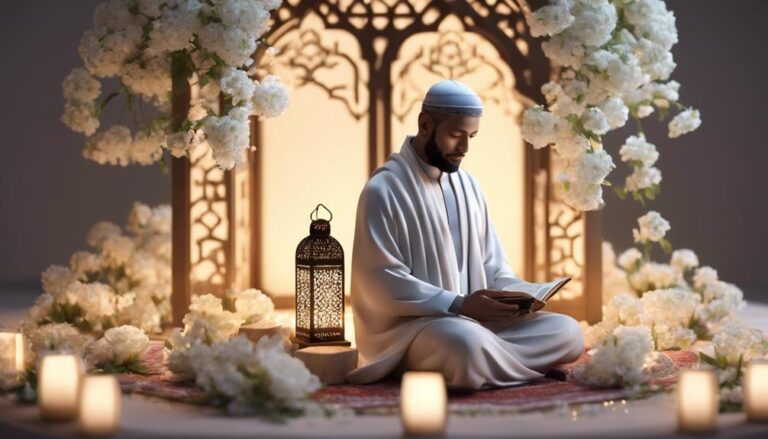Overcoming Negative Body Image and Low Self-Esteem in Islam
In Islam, start by recognizing your self-worth as a creation of the Almighty. Embrace self-acceptance by nurturing self-compassion and inner peace. Cultivate gratitude through reflection and journaling. Counter negative thoughts with positive affirmations resonating with your beliefs. Seek support from your community for shared understanding and sisterhood. Celebrate your inner beauty and uniqueness as gifts from Allah. Focus on self-reflection, gratitude, forgiveness, and positive connections. Reject societal beauty standards and find peace through prayer. By embracing these practices, you can commence on a transformative journey towards self-acceptance and confidence.
Key Takeaways
- Embrace self-acceptance through Islamic teachings.
- Practice gratitude to enhance self-worth and positivity.
- Seek support from the Muslim community for understanding and belonging.
- Focus on inner beauty and virtues to boost self-esteem.
- Reject societal beauty standards and seek validation from within.
Understanding the Islamic Perspective
To understand the Islamic perspective on overcoming negative body image and low self-esteem, reflect on the teachings of the Quran that emphasize self-love and self-acceptance. Islamic teachings stress the importance of recognizing one's self-worth as an individual created by the Almighty, perfect in His eyes. Embracing body positivity is rooted in the belief that your physical form is a gift from Allah and should be cherished and cared for. By nurturing inner peace through self-compassion and self-love, you initiate a journey of spiritual growth and self-improvement.
Self-care in Islam extends beyond physical acts to encompass nurturing your soul and mind. Taking steps towards personal development involves not only tending to your external appearance but also prioritizing your mental and emotional well-being. Through self-reflection and gratitude, you can enhance your connection with the divine and cultivate a deeper sense of self-acceptance. Remember, in the eyes of Allah, you're inherently valuable, deserving of love, and capable of achieving greatness.
Self-Reflection and Gratitude
In your journey towards embracing self-reflection and gratitude, consider the profound impact of acknowledging the blessings bestowed upon you by the Divine. It is essential to cultivate a mindset of gratitude through mindful reflection and gratitude practices. One powerful way to enhance this practice is by incorporating gratitude journaling into your daily routine. By writing down things you are thankful for, you can shift your focus towards positivity and abundance. Additionally, integrating self-care routines into your life can further enhance your sense of gratitude and self-worth.
| Gratitude Journaling | Self-Care Routines | Mindful Reflection |
|---|---|---|
| Write down blessings | Prioritize self-care | Practice gratitude daily |
| Reflect on positives | Engage in relaxation techniques | Meditate on blessings |
| Express thankfulness | Nourish your body and mind | Connect with nature |
Importance of Positive Affirmations
Embrace the transformative power of positive affirmations as you navigate your journey towards self-acceptance and inner peace. Daily affirmations hold the key to cultivating a positive mindset, shaping your perception of yourself and the world around you. By consciously choosing to speak words of self-love and empowerment, you initiate a powerful shift in your inner dialogue.
Building confidence through positive affirmations is a practice deeply rooted in the teachings of Islam. The Prophet Muhammad (peace be upon him) emphasized the importance of self-love and positive thinking. By reciting affirmations that resonate with your values and beliefs, you align yourself with the essence of your faith, fostering a sense of connection and purpose.
Incorporating daily affirmations into your routine can help counteract negative self-talk and boost your self-esteem. Remember, the words you speak to yourself matter. Choose kindness, choose empowerment, and watch as your confidence blossoms, guided by the light of positivity and self-compassion.
Seeking Support From Community
Joining hands with your community can be a crucial step towards healing and growth in your journey to self-acceptance and inner peace. Engaging in community outreach activities allows you to connect with others who may have similar struggles and experiences. This shared understanding can create a sense of belonging and support that's essential in combating negative body image and low self-esteem.
In Islam, sisterhood support plays an essential role in uplifting one another and fostering a sense of unity. By seeking support from your Muslim sisters, you can draw strength from the collective wisdom and compassion of the community. Sharing your challenges and triumphs with like-minded individuals can provide a safe space for vulnerability and growth.
Embracing Inner Beauty
Starting on the journey towards self-acceptance and inner peace involves recognizing and celebrating the radiance of your inner beauty. Within you lies a reservoir of inner strength and self-love that can illuminate your path towards a more positive self-image. Embracing your inner beauty isn't about conforming to societal ideals of perfection but rather about acknowledging your worth as a unique creation of the Divine.
By nurturing self-love, you're honoring the essence of your being and embracing a sense of wholeness that transcends physical appearance. Cultivate a mindset that values kindness, compassion, and gratitude towards yourself. Recognize that true beauty emanates from a heart that's pure and intentions that are sincere.
In Islam, inner beauty is viewed as a reflection of one's faith and character. The Prophet Muhammad (peace be upon him) emphasized the importance of cultivating inner virtues such as patience, humility, and generosity. By focusing on these qualities, you can enhance your inner beauty and radiate a positive light that shines from within. Trust in the journey of self-discovery and let your inner beauty illuminate the world around you.
Mindful Eating Habits
Nourish your body and soul through mindful eating habits that honor the sustenance provided by the Creator. Mindful eating involves being present in the moment, savoring each bite, and appreciating the nutrients that fuel your body. By paying attention to what you eat, you can enhance your emotional well-being and overall health.
Nutrition plays an important role in self-care. Choose foods that not only nourish your body but also uplift your spirit. Incorporate a variety of fruits, vegetables, whole grains, and lean proteins into your meals. These choices not only provide essential nutrients but also contribute to your overall well-being.
Embrace mindful eating as a form of worship. By being mindful of what you consume, you show gratitude for the sustenance provided to you. This practice can deepen your connection to the Creator and enhance your sense of spiritual fulfillment.
Physical Activity and Well-Being
Regular physical activity is a key component in nurturing your well-being and enhancing your overall health. Engaging in activities that strengthen your body not only benefits you physically but also has a profound impact on your emotional and spiritual well-being. The mind-body connection is a fundamental aspect of our existence, and through physical exercise, you can cultivate a harmonious balance between the two.
Setting fitness goals can provide you with motivation and a sense of accomplishment. Whether it's a daily walk, yoga practice, or joining a sports team, finding activities that you enjoy and that align with your values can bring joy and fulfillment to your life. Remember, in Islam, taking care of your body is a form of worship, as our bodies are entrusted to us by the Creator.
Overcoming Comparison Culture
Hey there, it's important to remember that each of us is uniquely created by the Divine, with our own set of strengths and weaknesses.
By embracing your individuality and focusing on self-acceptance, you can break free from the cycle of comparison that often leads to negative body image and low self-esteem.
Rejecting societal expectations and embracing your true self can lead to a deeper sense of contentment and fulfillment in your journey towards self-love and acceptance.
Embracing Individual Uniqueness
Embracing your individual uniqueness in Islam means recognizing and celebrating the distinct qualities and characteristics that make you who you are, rather than comparing yourself to others. Each person is created uniquely by the Divine, with a specific purpose and set of talents. By focusing on your own strengths and embracing your differences, you can cultivate a sense of self-love and appreciation for the beauty that lies within you.
To further understand the importance of embracing individual uniqueness, let's explore a table that highlights the contrast between comparing yourself to others and celebrating your own uniqueness:
| Comparing Yourself to Others | Embracing Your Individual Uniqueness |
|---|---|
| Leads to feelings of inadequacy | Promotes self-acceptance and confidence |
| Fosters competition and envy | Encourages self-discovery and inner peace |
| Diminishes self-worth | Enhances self-love and gratitude for your blessings |
Cultivating Self-Acceptance
Recognize the power within you to cultivate self-acceptance by shifting your focus from comparison to appreciation of your unique qualities and strengths in alignment with Islamic teachings. Embrace yourself as a creation of Allah, perfectly designed in His image.
Here are some ways to deepen your journey towards self-acceptance:
- Self-reflection: Take time for introspection to understand your thoughts and feelings. Engage in self-care practices such as mindfulness and dua to nurture self-awareness.
- Gratitude: Develop a habit of gratitude by acknowledging Allah's blessings in your life. Reflect on your strengths and accomplishments, no matter how small they may seem.
- Forgiveness: Forgive yourself for past mistakes and shortcomings. Seek emotional healing through seeking forgiveness from Allah and letting go of self-criticism.
- Community: Surround yourself with positive influences. Engage with supportive individuals who uplift your spirit and remind you of your inherent worth.
Rejecting Societal Expectations
To break free from the burden of societal expectations and overcome the toxic culture of comparison, it's essential to reframe your mindset towards embracing your unique journey and purpose in alignment with your faith. In Islam, the emphasis is on internal qualities and actions rather than external appearances. Rejecting societal norms that dictate unrealistic standards of beauty or success is a form of self-empowerment through Islam. Remember, Allah has created each person uniquely, and your worth isn't determined by how well you measure up to worldly standards.
Instead of comparing yourself to others, focus on cultivating qualities such as gratitude, kindness, and resilience. Understand that your value comes from your faith, character, and intentions. Seek validation from within by aligning your actions with the teachings of Islam rather than seeking approval from society. By letting go of the need to conform to societal expectations, you can embark on a journey of self-discovery and spiritual growth that's fulfilling and authentic. Trust in Allah's plan for you and embrace your individuality with confidence and grace.
Mental Health Awareness in Islam
Understanding mental health in the context of Islam is a journey of self-discovery and faith that can lead to inner peace and well-being. When facing challenges, remember these key points for maintaining mental well-being:
- Self-care in Islam: Recognize the importance of taking care of your mental health as part of your overall well-being. Engage in activities that bring you peace and tranquility, such as Dhikr (remembrance of Allah) or spending time in nature.
- Community Support: Seek comfort in the community of believers. Building strong relationships with others who share your faith can provide a sense of belonging and support during difficult times.
- Seeking Professional Help: In Islam, seeking help from mental health professionals is encouraged. Remember that mental health is a part of your overall health, and it's important to seek professional guidance when needed.
- Incorporating Spiritual Practices: Engage in regular acts of worship, such as Salah (prayer) and reading the Quran, to nourish your soul and find strength in your faith journey.
Finding Peace Through Prayer
Embracing the serenity that prayer offers can be a transformative experience, guiding you towards inner peace and spiritual fulfillment. Connecting with Allah through prayer not only provides a sense of tranquility but also serves as a powerful tool for inner healing. By turning to prayer, you open yourself up to divine guidance and comfort, allowing your heart and mind to discover self-discovery, resilience, and spiritual growth in the midst of life's challenges.
To help you visualize the impact of prayer on your well-being, here is a table showcasing the benefits of finding peace through prayer:
| Benefits of Prayer | Description |
|---|---|
| Spiritual Connection | Strengthening your bond with Allah and seeking guidance in times of need |
| Inner Healing | Finding comfort and healing for emotional wounds through prayer |
| Peace of Mind | Calming your thoughts and finding serenity in moments of distress |
| Increased Gratitude | Cultivating a sense of gratitude towards Allah for blessings received |
| Strength in Adversity | Drawing strength and resilience from prayer during difficult times |
Through prayer, you can set out on a journey towards self-discovery, resilience, and spiritual growth. Trust in the power of prayer to uplift your soul and bring peace to your heart.
Conclusion
Remember, in Islam, your worth isn't determined by your physical appearance. Embrace self-reflection and gratitude to overcome negative body image and low self-esteem.
Did you know that a study found that Muslims who regularly engage in prayer have lower levels of stress and anxiety compared to those who do not? Seek support, practice positive affirmations, and focus on inner beauty to find peace within yourself.
You're valued and loved just as you are.







